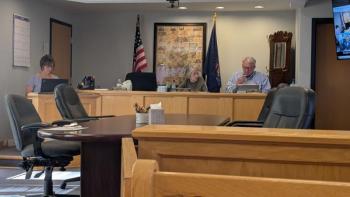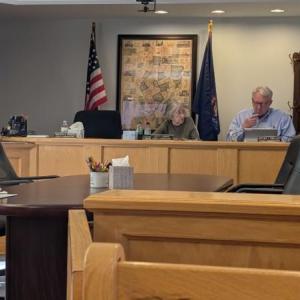Waldo County opioid spending raises transparency questions
Waldo County officials are struggling to explain their use of public funds as locals have begun questioning oddities in the county commission’s records.
Missing minutes, short staffing and foggy memories in the rural midcoast county have prevented officials from answering repeated questions about how the county commission spent more than $100,000 of opioid settlement funds and filled a $580,000 error in the county jail budget last year.
Maine’s counties have been receiving opioid settlement funds since 2022, with millions more set to be disbursed over the next 13 years. Some Waldo County residents took an interest in the commission’s work as The Maine Monitor reported that the county had spent thousands in opioid funds without disclosing where the money went.
Opioid settlement money is meant to be used to abate the harms of addiction, and the state has outlined a long list of accepted uses. Funds are not meant to go toward general budget support, but there are no spending disclosure requirements attached to the settlement.
Belfast resident Eric Buch first began paying attention to his county’s government when he hoped to apply for American Rescue Plan Act funds on behalf of a local organization. He found that the county’s funds had already been committed, and felt the commission had not done enough to inform the public that federal dollars were on the way.
When the county began spending opioid settlement money, Buch made sure to pay attention. He found record-keeping was lacking.
“The county is not very transparent about what it does,” he said. “They don’t do much in the way of engaging members of the wider community in participating or understanding what it is that they provide to the community.”
He said after months of asking around, he is still unsure of how the opioid funds were spent.
Minutes for twelve county commissioner meetings this year and last were missing from the county’s website as of mid-August. When asked for copies of the missing minutes, county clerk Barbara Arseneau provided seven; five documents from 2024 have yet to be transcribed “due to employee turnover and short-staffing” and could not be provided.
Without clear descriptions of what happened at the meetings, which typically occur twice a month, it is difficult to reconstruct how public funds were used.
What does appear in minutes from February 2024 is the fact that an error was discovered in that year’s jail budget. It totaled $580,544.34, but no explanation of what caused the “discrepancy” was made in the minutes. No recording of the meeting exists either; the minutes cite technical issues as the reason for this.
Budget documents suggest the missing money was the result of anticipated revenue from the state that never came through. It’s not clear what funds were expected or why they never arrived. County corrections directed inquiries to the Waldo County Sheriff’s Office; the office has not responded to repeated requests for comment.
At the February meeting, commissioners discussed using money from its opioid settlement fund account to cover the budget shortfall, but this motion failed. According to the minutes, then-commissioner Amy Fowler argued that moving the funds would not fix the problem. Fowler could not be reached for comment.
Minutes from October reveal that $140,272.15 was moved from the opioid account to the corrections budget. After a lengthy executive session, the commissioners unanimously approved the transfer “to update the correction from the 2024 Jail budget… to make that whole.”
Commission Chair Betty Johnson, the only current commissioner who was present at the meeting, declined to comment on the transfer or the purpose of the executive session.
“We were looking at accounts and so forth,” she said. “That’s all I’m saying. Nothing more.”
Thomas Wagner was the chair of the county budget committee for the 2024 budget season. He confirmed there was a budget hole and that it was filled, but said he didn’t remember the details and could not comment further.
“Boy, you’re rattling some old brain cells,” he said over the phone. Another person could be heard in the background, urging him not to speak about the matter.
Johnson also said she did not recall the shortfall in the corrections budget clearly and referred all questions to Commissioner Kevin Kelley, who joined the commission in January. Several other county officials also directed requests for comment to Kelley.
Kelley, who was not on the commission at the time the budget decisions were made, said the opioid funds transfer was not connected to the corrections budget hole.
Kelley acknowledged that there was a payment from the county’s opioid settlement fund to the corrections department and said funds went to supporting Volunteers for America, a recovery center and the county’s contributions to Two Bridges Regional Jail. He could not specify how much went to each, or when the decision was made.
A May report by the Maine County Commissioners Association compiled uses of opioid money across the state. While most counties outlined specific purposes for the funds, often medication assisted treatment for substance abuse, the report lists Waldo County as spending $140,272.15 on “jail expenses.”
Kelley, then a candidate for the commission, was present at the February 2024 meeting when the shortfall was revealed and the possibility of filling it with opioid funds was first discussed. He acknowledged the shortfall, but was not aware of how it was filled.
Since joining the commission, Kelley has pushed the county to establish a process for determining how future opioid funds will be distributed. Earlier this month, the commission set up an ad hoc committee to select members for a standing opioid committee that will decide how to use future funds.
“This move reflects Waldo County’s commitment to ensuring that opioid settlement funds are allocated in a way that directly supports prevention, recovery, treatment and harm reduction within the community,” the commissioners said in a press release published Thursday. “The standing Opioid Committee will collaborate with local organizations, physicians, addiction specialists and educators.”
The state has also pushed for governments to organize their opioid fund disbursement process. It set up the Maine Opioid Settlement Support Center specifically to help guide local governments on spending.
As of early August, only a few jurisdictions receiving opioid money had not yet been in touch with the center for guidance; Waldo County first contacted the center last week after officials were asked about the program by The Monitor.
Buch is not rushing for a spot on the county’s opioid committee. He said spots should go to those with more knowledge of addiction who are better equipped to guide spending. He said he hopes his fellow concerned citizens get on board.
“The time has come where there needs to be much greater attention to what county government does and a greater effort to hold them accountable,” he said.
Daniel O’Connor is a Report for America corps member who covers rural politics as part of the partnership between The Maine Monitor and the Bangor Daily News, with additional support from BDN and Monitor readers.
This story was originally published by The Maine Monitor, a nonprofit civic news organization. To get regular coverage from The Monitor, sign up for a free Monitor newsletter here.
























